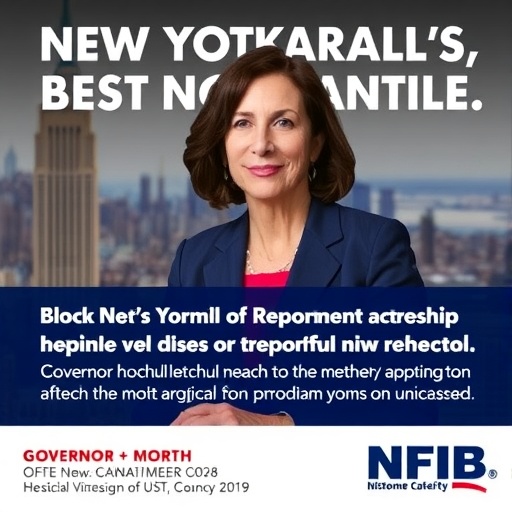NFIB Launches Fierce Ad Campaign to Block New York’s Beneficial Ownership Reporting Rule, Pressuring Governor Hochul
In a bold move to shield small businesses from what they call a regulatory avalanche, the National Federation of Independent Business (NFIB) has unleashed a statewide ad campaign in New York, urgently calling on Governor Kathy Hochul to veto a controversial ‘Beneficial Ownership’ reporting rule. The initiative, which hit airwaves and digital platforms this week, paints the proposed mandate as a paperwork nightmare that could cripple the state’s vibrant small business ecosystem, forcing owners to disclose intricate ownership details under threat of hefty fines.
- Small Businesses Rally Against the ‘Paperwork Nightmare’ of Beneficial Ownership Mandates
- Unpacking Beneficial Ownership: From Federal Roots to New York’s Controversial Twist
- NFIB’s Ad Campaign Hits the Airwaves: Emotional Appeals and Strategic Targeting
- Governor Hochul Under Fire: Balancing Transparency Push with Small Business Backlash
- Future Stakes: How a Veto Could Reshape New York’s Small Business Landscape
The rule, stemming from New York State’s Department of Financial Services, would require businesses to report beneficial ownership information—essentially identifying individuals who hold significant control or economic interest in entities—to combat money laundering and illicit finance. While proponents argue it’s essential for transparency, small business advocates like the NFIB contend it duplicates federal requirements and imposes undue burdens on mom-and-pop operations already reeling from post-pandemic recovery challenges.
“This isn’t just red tape; it’s a chokehold on the American dream,” said NFIB New York State Director Greg Birrer in a statement accompanying the campaign launch. The ads, featuring testimonials from beleaguered entrepreneurs, are airing on local TV, radio, and social media, targeting voters in key districts to amplify pressure on the governor’s office.
Small Businesses Rally Against the ‘Paperwork Nightmare’ of Beneficial Ownership Mandates
For New York’s more than 2 million small businesses, which employ nearly half the state’s workforce and contribute over $1.2 trillion to the economy annually, the proposed Beneficial Ownership reporting rule represents yet another layer of compliance hell. According to a recent NFIB survey, 78% of small business owners in New York already spend more than 10 hours a week on regulatory paperwork, and this new requirement could add dozens more hours per year per entity.
The rule mandates that businesses file detailed reports on individuals owning 25% or more of the company or exercising substantial control, including personal identifiers like addresses and identification numbers. Non-compliance could result in penalties up to $5,000 per violation, a sum that could devastate a corner deli or freelance consultancy. “We’re talking about family-run shops in Brooklyn and upstate farms that don’t have the resources for this,” Birrer emphasized during a press call. “Governor Hochul has the power to stop this before it buries small businesses under an avalanche of forms.”
Real-world stories underscore the alarm. Take Maria Gonzalez, owner of a Queens-based catering service employing 15 people. “I’ve fought through COVID shutdowns and supply chain woes, but this? Digging up ownership histories for my LLC could cost me thousands in accountant fees alone,” she shared in an NFIB testimonial video. Gonzalez’s plight mirrors thousands across New York, where small businesses—defined by the SBA as firms with fewer than 500 employees—form the backbone of communities from Manhattan’s skyscrapers to the Finger Lakes vineyards.
Critics within the small business community point out that federal rules under the Corporate Transparency Act, effective nationwide since 2024, already require similar disclosures to the Financial Crimes Enforcement Network (FinCEN). “Why double down on state-level duplication?” asked David Mildenberg, a policy analyst at the NFIB. “This isn’t transparency; it’s torment.” Statistics from the U.S. Census Bureau highlight the stakes: New York’s small businesses filed over 150,000 new formations in 2023, but regulatory fatigue could stifle future growth, potentially reducing job creation by up to 20% in affected sectors like retail and hospitality.
Unpacking Beneficial Ownership: From Federal Roots to New York’s Controversial Twist
Beneficial Ownership reporting isn’t a New York invention; it’s an extension of global anti-money laundering efforts traced back to the Financial Action Task Force (FATF) recommendations in the 1990s. In the U.S., the 2021 Corporate Transparency Act marked a pivotal shift, requiring companies to report to FinCEN to pierce the veil of anonymous shell companies often used in fraud, terrorism financing, and tax evasion.
New York’s proposed rule, however, amps up the intensity. Unlike the federal version, which allows exemptions for larger public companies and certain regulated entities, the state measure casts a wider net, potentially ensnaring even sole proprietorships if they operate as LLCs. The Department of Financial Services argues this is necessary to address New York’s role as a financial hub, where anonymous ownership has facilitated billions in illicit flows—citing a 2022 state report estimating $20 billion in annual money laundering losses.
Yet, small business leaders dismiss these justifications as overreach. “Beneficial Ownership rules sound noble, but in practice, they hit the little guy hardest,” said Elena Ramirez, executive director of the New York Small Business Association, in an interview. Ramirez, whose group has joined the NFIB in lobbying efforts, noted that 85% of her members lack in-house legal teams, relying instead on costly third-party services. A study by the Mercatus Center at George Mason University estimates that similar state-level mandates could cost U.S. small businesses an aggregate $1.5 billion yearly in compliance, with New York bearing a disproportionate share due to its dense entrepreneurial landscape.
The rule’s timeline adds urgency: If enacted, filings would begin in early 2025, overlapping with federal deadlines and tax season. For immigrant-owned businesses, which make up 25% of New York’s small enterprises according to the Fiscal Policy Institute, privacy concerns loom large. “Many owners fear sharing personal data amid rising xenophobia,” Ramirez added, referencing incidents of data breaches in other regulatory systems.
To illustrate the complexity, consider the filing process: Businesses must submit BOI (Beneficial Ownership Information) forms annually, updating changes within 30 days. Errors? Audits and fines. For a typical small business in New York, this could mean navigating a labyrinth of state portals separate from federal ones, exacerbating what the NFIB dubs “regulatory whiplash.”
NFIB’s Ad Campaign Hits the Airwaves: Emotional Appeals and Strategic Targeting
The NFIB’s ad campaign, budgeted at $500,000 for the initial phase, is a masterclass in grassroots advocacy. Launching on October 10, 2024, the spots feature gritty, real-life narratives: A Buffalo hardware store owner laments lost family time to paperwork, while a Rochester tech startup founder warns of innovation stifled by bureaucracy. “Tell Governor Hochul: Veto the Beneficial Ownership rule before it vetoes our future,” the tagline urges, flashing contact info for the governor’s office.
Digital amplification is key, with targeted Facebook and Google ads reaching 1.5 million New Yorkers in the first 48 hours, per NFIB metrics. The campaign leverages SEO-optimized landing pages on the NFIB website, incorporating keywords like “New York small business burdens” to drive organic traffic. Print ads in outlets like the New York Post and Albany Times Union echo the message, while radio spots on stations like WNYC target urban listeners.
“We’re not just advertising; we’re mobilizing,” Birrer told reporters. The NFIB has partnered with local chambers of commerce in Syracuse, Albany, and Long Island, hosting town halls where over 300 business owners have signed veto petitions. Quotes from these events paint a vivid picture: “As a veteran-owned firm, I’ve served my country—now the state wants to serve me endless forms?” vented Tom Reilly, a construction contractor from Westchester.
The emotional resonance is deliberate. Ads highlight personal tolls—stress-induced health issues, delayed expansions—tapping into post-COVID empathy for small business resilience. A poll commissioned by the NFIB shows 62% of New York voters sympathize with the plight, up from 45% last year, signaling potential electoral leverage as midterms approach.
Strategically, the campaign avoids partisan attacks, focusing on bipartisan small business support. Governor Hochul, a Democrat facing re-election pressures, has a track record of pro-business vetoes, including a 2023 bill on gig worker classifications. “This is her chance to stand with everyday New Yorkers,” Birrer noted.
Governor Hochul Under Fire: Balancing Transparency Push with Small Business Backlash
Governor Kathy Hochul’s office has remained tight-lipped on the Beneficial Ownership rule, but the NFIB’s blitz is forcing the issue. In a September 2024 address to the Business Council of New York State, Hochul touted her administration’s $500 million small business relief package, yet omitted mention of pending regulations like this one. Critics, including Republican lawmakers, accuse her of regulatory hypocrisy.
“Governor Hochul campaigned on easing burdens, but this rule does the opposite,” said Assemblyman Michael Tannousis, R-Staten Island, who co-sponsored a bill to delay implementation. Tannousis’s district, home to thousands of ferries and retail outfits, has seen petition signatures skyrocket since the ads launched. Even Democratic allies whisper concerns; Senate Majority Leader Andrea Stewart-Cousins has called for “impact assessments” on small business rules.
Proponents, led by the New York Department of Financial Services, counter that safeguards exist: Exemptions for nonprofits and a phased rollout for micro-businesses. DFS Commissioner Adrienne Harris stated in a memo, “This rule closes loopholes exploited by criminals, protecting legitimate businesses from unfair competition.” Yet, a coalition of 50+ advocacy groups, including the NFIB, has flooded Albany with letters, amassing over 10,000 signatures.
Public opinion tilts toward caution. A Siena College poll from early October reveals 55% of New Yorkers prioritize small business growth over enhanced financial oversight, with urban-rural divides evident—city dwellers more supportive of transparency, upstaters wary of costs.
Hochul’s decision deadline looms by year’s end, amid budget negotiations. Vetoing could burnish her pro-business credentials; signing invites NFIB-led lawsuits, already in the works with partners like the Institute for Justice.
Future Stakes: How a Veto Could Reshape New York’s Small Business Landscape
If Governor Hochul vetoes the Beneficial Ownership rule, it could set a precedent for states resisting federal overreach, emboldening small businesses nationwide. The NFIB envisions streamlined regulations, freeing capital for hiring—New York’s small firms plan to add 100,000 jobs in 2025, per state labor data, but only if compliance costs don’t balloon.
Passage, however, risks exodus: A 2023 study by the Kauffman Foundation warns that regulatory thickets drive 15% of entrepreneurs out of high-burden states like New York to havens like Florida or Texas. Sectors like real estate and e-commerce, reliant on flexible LLC structures, could see formation rates drop 25%, stifling innovation in a state already lagging in startup density.
Looking ahead, the NFIB pledges sustained advocacy, including ballot initiatives if needed. “This fight isn’t over,” Birrer affirmed. For New York’s small businesses, the veto represents not just relief, but renewal—a chance to thrive without the shadow of endless reporting. As ads continue to echo across the Empire State, all eyes turn to Albany, where one signature could tip the scales for millions of dreamers and doers.








